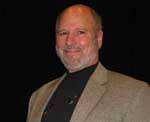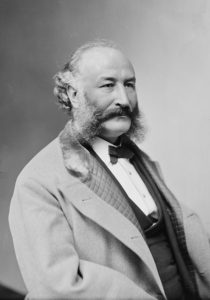By Jerry Klinger


(Photo: Wikipedia)
SAN FRANCISCO — The San Francisco School Board voted 6-1 on January 29 to rename over 40 schools. The Board believes it inappropriate to have schools named for people who have been “engaged in the subjugation and enslavement of human beings, oppressed women, committed acts that led to genocide or who otherwise significantly diminished the opportunities of those amongst us to the right to life, liberty and the pursuit of happiness.”
George Washington, Abraham Lincoln, Theodore Roosevelt, Diane Feinstein, John Muir, James Lowell, Paul Revere are on the list of the unsuitable, as is Adolph Sutro. Malcolm X was on the list. Malcolm X was a pimp at one time in his life. After long discussion, the Board felt the totality of his life should be considered, and his name should not be removed.
A few months ago, the Jewish American Society for Historic Preservation was approached by a representative of the Friends of the Sutro Tunnel. JASHP was asked if they would donate historical interpretive markers, 3 National Park Service style inclined laybys.
The Friends of the Sutro Tunnel are mining history enthusiasts from the Dalton, Virginia City, Nevada area striving to preserve, interpret and reopen the engineering marvel of the 19th century’s Comstock Lode, the Sutro Tunnel, built by Adolph Sutro.
Sutro was a Jewish immigrant, a refugee from the anti-Semitic world of Germany that measured a person by who they were and not what they could do. In America, on the frontiers and in the mining boom towns, a person’s worth was first what they could do, not if they were Jewish.
Sutro, a brilliant engineer, and entrepreneur grasped the golden ring of opportunity. He recognized a desperate engineering need of Comstock Mining. He built an incredible four-mile-long drainage and communication tunnel under the Comstock to make successful mining possible. Silver extracted from the Comstock Lode helped build San Francisco.
JASHP agreed to help the Friends provided Sutro’s Jewish heritage be identified in the markers. Without hesitation, the condition was agreed to.
In 1879, Sutro sold his interests in the Tunnel. He relocated to the City by the Sea. Investing brilliantly in San Francisco real estate. He became very, very wealthy. He used much of his funds philanthropically, developing public park land, libraries, and public expressions of Victorian art.
Sutro was elected the Mayor of San Francisco, 1894-96. He was the first American Jew to be elected the Mayor of a major American city. He served one two-year term as a popular Progressive but found politics very unpleasant.
After years of work and development, in 1896, Sutro opened the Sutro Baths, dramatically overlooking the Pacific in the Lands’ End area. It was the world’s largest public swimming complex, and an entertainment venue open to all San Franciscans. To keep access to the Baths affordable, he built his own rail line, countering the Southern Pacific Railroad. Sutro insisted the fare be as inexpensive as possible.
California was and is always a legislatively progressive State. March 1897, the nation’s first public accessibility law prohibiting racial discrimination in public accommodations, recreational facilities, restaurants, and baths was passed. It was called the Dibble Act. Four months later, John Harris, an African American, along with a group of his White friends, went to the Sutro Baths to test the Dibble Act. Harris’s friends were admitted to the Baths. Harris was not.
Harris sued Adolph Sutro for damages, $10,000 for discrimination, violating the Dibble Act, and causing him great personal distress. The suit went to court. The jury was very sympathetic to Sutro’s attorney’s argument that admitting a Black man to the baths would seriously harm the business. White San Franciscans would not share the same pool with a Black. Very reluctantly, and only after the judge required the jury follow the law, the jury found in Mr. Harris’ favor. He was awarded $100.
Nothing changed. San Francisco’s racial intolerance remained. The Sutro Baths were not desegregated until the 1930s.
Before Sutro became Mayor, San Francisco regarded Sutro very highly. 1891, they renamed a ramshackle school near Geary Boulevard the Sutro Primary School.
Rebuilt, Sutro Elementary was formally established in 1894 on 12th Ave., opening in 1895.
JASHP contacted present day Sutro Elementary, asking if they had an interpretive marker explaining who the school was named after. The school did not. JASHP offered to fund one. The administrator responded very positively.
A conditions of the gift was Sutro’s Jewish heritage must be recognized in the text.
The administrator had no problem with the condition. She also confirmed that she did not believe the school would be renamed.
When the School Board voted to rename schools in January, it had set off a firestorm of criticism. The renaming was tabled for later consideration because Mayor London Breed said the focus on name changes was a poor use of time and money during the pandemic. The School Board should be paying attention to reopening schools safely.
It was a convenient excuse. The renaming report was widely criticized as hollow, Wikipedia level academic analysis of complicated issues.
JASHP submitted the final text for the marker to Sutro Elementary. His heritage was acknowledged.
“Adolph Sutro was born in Prussia in 1830. He emigrated to the United States in 1850, seeking opportunities, toleration and freedom, denied him in Prussia because of anti-Semitism.”
After a few days, the principal responded through her administrative assistant, “Thanks, but we will pass.”
JASHP does not believe the rejection of the gift was anti-Semitic. The rejection reflected the uncertainty of the School Board’s future agenda.
The hearing to remove Sutro’s name in January had lasted less than two minutes. He was labeled a racist, not suitable for an elementary school’s name. The totality of his life, where issues of discrimination had never existed before, did not matter.
When the Harris racial incident occurred, Adolph Sutro was not involved. He was the owner of the Baths in name only. The Baths were managed by his son. Sutro had long retreated to his home in San Francisco and lived a private, secluded life.
Adolph Sutro was severely debilitated by dementia when the Harris incident occurred.
By the time the Harris case had made its way through the courts, Sutro had two strokes. He was ruled legally incompetent to handle his own affairs and placed under the guardianship of his daughter. She removed him from his home. He died in 1898, far from anything he knew.
The School Board decision to remove Sutro’s name was as incompetent as was Sutro when Harris was denied admission to the Baths.
Golden Gate Park has a beautiful lake named to honor the late 19th century San Francisco Parks Commissioner William W. Stow. Stow had been the California State Assembly Speaker and Gubernatorial candidate under the Nativist Know Nothing Party in the 1850s. A principal plank of his candidacy was keeping Jews out of California.
Stow said, “I have no sympathy with the Jews and would it were in my power to enforce a regulation that would eliminate them from not only our county but from the entire state! I am for a Jew tax that is so high that [Jews] would not be able to operate any more shops. They are a class of people here only to make money and who leave the country as soon as they make money.”
Fortunately for the American Jewish experience and California, he was soundly defeated. Though Stow may have remained anti-Semitic, he never again advanced another anti-Semitic agenda into California life.
Stephen Miller, a San Francisco native, learned about Stow and began an effort to have Stow Lake renamed. Reasoning, if the woke agenda is to rename schools in San Francisco, many of which are for Jews, Stow Lake should also be renamed.
He approached every Jewish organization in San Francisco for support, finding none. He went to the Jewish Caucus in Sacramento and could not even get a return response.
The Jews did not want to get involved.
JASHP contacted Michele Gee at Golden Gate National Park offering Sutro interpretive markers. Ms. Gee said they had just ordered new ones fabricated and regretfully did not include recognition of Sutro’s Jewish heritage. It was a good idea.
JASHP is willing to fund new replacement markers for Golden Gate National Park, if desired.
Wokism works discriminatorily, selectively, superficially, maliciously with political objectives.
*
Jerry Klinger is the president of the Jewish American Society for Historic Preservation.
Thoughtful article, well researched.
I’m reminded of Jesus’ words, “Let him who is without sin cast the first stone.” Truth be told, what human has not at some point uttered something regrettable or acted inappropriately in some manner?
We should all stand against racism and bigotry, certainly. But taken to the extreme, cancel culture will have no one to admire. We can applaud the contributions of flawed people without lauding their deficiencies. And in Mr. Sutro’s case, it would seem markedly unfair that he be judged for an action in which he did not participate. “There is none so blind as he who will not see.”
UNFORTUNATELY America seems to be going through a denial of the good that their early leaders did for them. Shame, it really doesn’t help a person to live in denial.